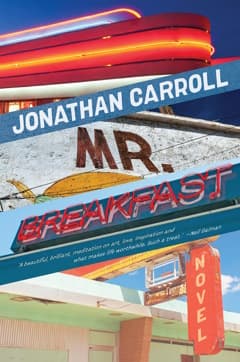
Mr. Breakfast by Jonathan Carroll
(Melville House, 2023)
Reviewed by Dave M. Roberts
It is quite normal to wonder how life may have turned out if different choices had been made. Would following that hobby as a career have made us happier, or relinquishing ambitions for the sake of a relationship? It is somewhat unusual to be presented with that opportunity. After a spur of the moment decision to get a tattoo, Graham Patterson is offered exactly that. He is drawn to the artwork in a tattooist’s window and in particular a strange and multi-layered piece called Mr Breakfast. After receiving the tattoo, he is told that he can now experience three different versions of his life, one his current life, and two others resulting from different life decisions. He can switch between the lives for a very limited number of times, but must ultimately choose one. From this slightly disappointing and somewhat contrived premise, Carroll spins up a deeply affecting story that explores the way that we choose to live our lives and what is really important to us. Not just that, but how our life decisions affect those around us. Trying to do the right thing does not always work out, and what is actually the right thing when the choices you make ripple out and impact on a great many people?
It transpires that Patterson is not the only person with the tattoo. We meet a number of those who also have it, most if not all of whom are connected, however tenuously, with one or more of Patterson’s lives. The ripples made by his differing lives move through the lives of those close to him, but also through those with often only the most tenuous connection. In two of Patterson’s lives he has some measure of fame. He is a failing comedian when we first encounter him, but gets to see the success he could have had, had he followed the advice of his agent. Having failed in one field, he finds he has a skill for photographing the mundane and presenting it in such a way as to give the pictures great depth and meaning in that apparent mundanity. It is this ability that makes him a much sought-after photographer whose works are highly prized. We get the perspective of those linked to him. We see the impact of his decisions from the perspective of those others, such as how his wife is affected by his reluctance to have children, and this is something he can’t directly comprehend. Nor can he comprehend the fan of his photography trying to track down elusive and almost mythical pictures that Patterson is believed to have taken. It is made clear that the multiplicity of choices by so many mean that personal choices can be made in the most surprising ways.
Patterson’s attempts to put some structure into his final choice are almost bound to fail. Revisiting parts of his life by returning to childhood locations, combined with the multiple lives he is experiencing, confuses not just the present, but also the memories themselves. They become more real, but also displaced in time, some even being dragged into Patterson’s present. The longer he delays making a choice, the more the events of his lives and memories become mixed. While there is no time limit for the choice of his life, prevarication is evidently not a sensible option as his world becomes more and more unstable as lives and memories mix.
In the end, the way his decision is made is somewhat abrupt and quite shocking. It is also, in many, almost inevitable as it pulls together a number of the ideas in a somewhat unexpected way forcing things for Patterson. Was it what he wanted all along? Quite possibly, we’ll never really know, but then that’s how life works. Mr. Breakfast, in all its forms, makes us look at the world in new and interesting ways, and is in itself a thing of beauty.
Review from BSFA Review 20 - Download your copy here.
